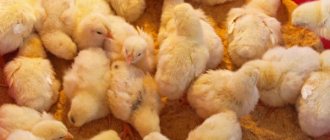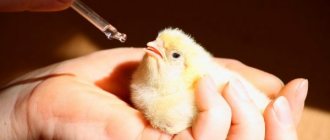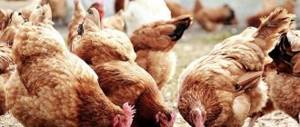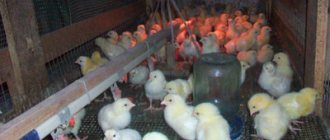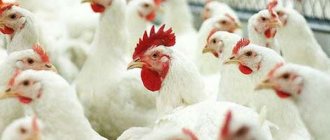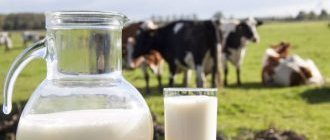Eating well: tips
In order for the breeding of broiler chickens to turn out to be an unprofitable business, it is important to have adequate nutrition in the first days of the chicks’ existence.
It has many similarities with the nutrition of ordinary chickens. It should be remembered that:
- In the first days, we strongly recommend using finely crushed wheat and oatmeal. Grains should make up more than half of their diet.
- On the 3rd day of life, young animals can already consume green food, which contains vitamins for chickens. The greens must be thoroughly chopped and added to the food. For the first time, you should limit yourself to six grams of greens per head. If there is no grass, then you should limit yourself to sprouted barley. Herbal flour is also recommended. It is recommended to introduce it into the diet on the 5th day of life. We strongly do not recommend exceeding this norm due to the high concentration of fiber in it. Small broilers are not yet able to process it due to imperfect development of the gastrointestinal tract.
- Adding red carrots to your diet allows you to compensate for the deficiency of a large number of vitamins, macro- and microelements. It contains a large amount of carotene. It has been established that 1 g of carrots contains up to 100 mcg of carotene. You can include fresh, salted or dried carrots in your diet. It is recommended to introduce it on the 5th - 7th day of life of chickens. First, it should be thoroughly crushed and added to the food moistened with water. You should adhere to the norm of 3 to 5 grams per broiler during the day.
- Essential vitamins are included in processed fish waste, which is sold in the form of bone meal. It should be given about 6 grams per broiler, bringing the initial rate in the future to 15 grams.
- Feeds containing protein should not exceed 16% of total dry food. It is recommended to include whey, buttermilk and cottage cheese in the diet of young animals.
- When chickens reach 3 weeks of age, one fifth of the grain crops should be replaced with crushed potatoes. It is recommended to add it to mash. Birds like this kind of food.
Soldering scheme
Feeding small chickens by adding antibiotics and vitamins to their drinking water has a number of advantages:
- Does not require high labor costs.
- Provides processing of the entire livestock. Even if there is no appetite, the bird will drink.
- Vitamins and antimicrobial agents are in the best form for absorption - an aqueous solution.
Before giving chickens water, it is necessary to study the instructions for use of a particular drug. Most medications are designed to require daily changes of drinking water.
There is no uniform scheme for feeding vitamin preparations and antibiotics to prevent diseases of chickens in the first days of life. The only limitation is the impossibility of using products - eggs or poultry meat for some time after their treatment. In order to protect day-old chicks in the first days of life from diseases against which antibiotics are powerless, you should purchase factory-made starter feed that contains coccidiostatics.
Compound feed
There are the following approaches to feeding chickens:
- During the first week of life, vitamins and glucose or sugar are added to drinking water. From eight days of age, antibiotics are used for chickens for 3–5 days.
- From the 1st to the 5th day of life we give antibiotics. On days 6–11 - complex vitamin preparations. On the 15-17th day, fortification is repeated. From the 18th to the 22nd day, these antimicrobial agents are administered again. If the starter feed does not contain a coccidiostat, Baykox is soldered on the 12th–14th day.
- Alternative drinking regimen. The following medications are added to 1 liter of drinking water for chickens:
- On the first day, a vitamin complex is given with the addition of 20 g of glucose.
- On the second day, 500 mg of the antibiotic Tetracycline is dissolved in drinking water for broiler chickens.
- On days 3–4, the previous solution is enriched with the same amount of Levomycetin. As an option, Penicillin is taken for all three days.
- On days 5-8, complex vitamin preparations are used again.
- To strengthen the bones at home, traditional veterinary medicine recommends giving crushed calcium gluconate tablets to broiler chickens. The period of mineralization is 5–45 days of life. Such treatment does not harm the health of broilers, but it does lead to an increase in the cost of meat.
Tetravit
The need for watering is influenced by the breed of young animals. If the chickens are ordinary, then the procedure is not necessary. If you purchased a broiler or hybrid breed that is susceptible to unfavorable conditions, then it is necessary to solder it. Otherwise, there is a high probability of losing the entire livestock.
The drugs used for drinking not only prevent fatal pathologies, but also have a positive effect on the development of the body, the functioning of the digestive system, and help increase the productivity of birds in the future.
To choose the right drinking regimen, you should ask the seller:
- whether any drugs were used before the sale of young animals;
- what medications were used;
- whether young livestock were vaccinated;
- whether any illnesses occurred in the parents of the brood.
Choose one of two drinking schemes.
Table of the first drinking regimen.
| First day | Newborns should be given dissolved glucose to drink so that the residual yolk is absorbed faster. The solution has an immunostimulating and anti-inflammatory effect, strengthens the digestive system, and reduces susceptibility to stress. Use a 3 or 5% solution. You can buy it at the pharmacy or prepare it yourself: 1 teaspoon of sugar per liter of water. |
| 2-7 days | The use of vitamins begins. A good option for drinking is the Lovit complex (5 ml dissolved in a liter of water). |
| 8-10 | Antibiotics are administered according to the instructions: Baytril, Enrostin, Enroflox. |
| 11-18 | Pause between courses. |
After a pause, the course is repeated, and so on throughout the life of the bird.
| Until 5 days | Antibiotics are used: Baytril (1 ml ampoule per 2 liters of water), Enroxil - according to the instructions. |
| 6-10 | Vitamins used: Chiktonik complex or Aminovital (2 ml per liter of water). |
| 11-14 | Prevent coccidosis. Usually the drug Baycox is used (1 ml ampoule with a 2.5% solution per liter of water). |
| 15-18 | Repeat the course of vitamins according to the same scheme. |
| 19-22 | Repeat the course of antibiotics. |
Vitamin preparations for chickens
The market offers the following traditional and modern drugs in demand by poultry farmers:
- Fat-soluble vitamins.
- Water-soluble complex.
Fat-soluble vitamins
Traditionally, the following fat-soluble vitamin preparations are used in poultry farming:
- Fish fat. Recycling waste. Contains vitamins A, D, E, necessary for vital functions. However, the drug has a limited shelf life, no more than six months, if stored at 20 °C or less. The resulting peroxides can kill the chicks. Should I use fish oil if I have signs of vitamin deficiency? It's better not to take risks.
- Trivit (Trivitamin). The drug received this name because it contains 3 main biologically active compounds. Vitamin A is responsible for growth, D for bone development, E has antioxidant properties. Having noticed the symptoms of vitamin deficiency, Trivit is used for treatment, mixed with food and instilled into the nasal openings of each chicken. This is inconvenient and requires a lot of manual labor.
- Tetravit. Same as Trivit + component F, which is a complex of unsaturated carboxylic acids contained in sunflower oil.
Giving vitamins to chickens
Water-soluble complex
The following drugs are in demand:
- Chiktonik. Liquid for oral use. Contains a mixture of fat-soluble, water-soluble vitamins and amino acids. Retinol, Ergocalciferol, Tocopherol are converted into a water-soluble form using an emulsifier. The drug satisfies the chicken's needs for biological catalysts and essential amino acids. It has an anti-stress effect and is used when transporting poultry or extreme heat. It can be used for young animals and chickens. To minimize irritating factors, the drug is given to the birds 3 days before the intended transportation and 3 days after it.
- Aminovital. A drug similar to Chiktonik. Additionally contains minerals and vitamin C.
- Nutril Se. Powder, which is a water-soluble multivitamin mixture. It is inferior to Chiktonik and Aminovital in terms of amino acids, but contains selenium, which has antioxidant activity. It can be given as an immune stimulant.
Chiktonik
Features and expediency of drinking
Farmers have an ambiguous attitude towards drinking. Some believe that the procedure is extremely important for the preservation of young animals. Others believe that it is enough to follow the rules of care and feed the chicks well for them to survive. Some poultry farmers give antibacterial and vitamin preparations to chickens already in the first days of their life, others use only vitamins.
The need for watering is influenced by the breed of young animals. If the chickens are ordinary, then the procedure is not necessary. If you purchased a broiler or hybrid breed that is susceptible to unfavorable conditions, then it is necessary to solder it. Otherwise, there is a high probability of losing the entire livestock.
The drugs used for drinking not only prevent fatal pathologies, but also have a positive effect on the development of the body, the functioning of the digestive system, and help increase the productivity of birds in the future.
To choose the right drinking regimen, you should ask the seller:
- whether any drugs were used before the sale of young animals;
- what medications were used;
- whether young livestock were vaccinated;
- whether any illnesses occurred in the parents of the brood.
Features of drinking
Before carrying out drug prevention of diseases in young animals purchased at a poultry farm or from another breeder, it is necessary to collect information about the livestock at the place of purchase.
Namely:
- Were broilers or laying hens vaccinated or given vitamins before sale?
- If yes, then clarify what drugs were used;
- Inquire about the method of prevention;
- Find out the presence of diseases in parent chickens;
- Pay attention to where the birds are kept and their food.
It is imperative to ask the seller any questions you are interested in, since each poultry farmer has his own opinion on what preventive treatment measures are needed for chickens.
Some give medications from the first day of life, other breeders add only vitamins to the diet, and lovers of everything natural completely exclude drug prophylaxis.
Depending on the information received, the new owner of small chickens will be able to decide how, when and what drugs to use when raising young animals.
The most common drugs
There are a large number of drugs available on the market for feeding day-old and week-old chicks. Before carrying out the procedure, you should carefully study the instructions for the antibiotic and vitamin complex.
Vitamin
Vitamin complexes for drinking are divided into fat-soluble and water-soluble.
Fat-soluble vitamins
Experienced poultry farmers use the following vitamins for feeding:
- Fish oil, saturated with vitamins A, E, D, important for the full development of the bird's body. When using the product, you should carefully monitor its shelf life, which is no more than 6 months under correct storage conditions. Spoiled fat is extremely harmful to chicks.
- Trivit, based on vitamins A, E, D. To prevent hypovitaminosis, the solution is instilled into the nostrils of birds and mixed with food.
- Tetravit. The composition is similar to the previous one, plus vitamin F (unsaturated fatty acids).
Water-soluble complex
Vitamins for drinking:
- Chiktonik, which is a mixture of vitamins A, D, E, amino acids. The liquid solution has an anti-stress effect, so it is given not only to young animals, but also to transported chickens to calm them down (within 3 days before and after transportation).
- Aminovital. The composition is similar to the previous one, but minerals and ascorbic acid are added.
- Nutril Se is a powder complex used as an immunostimulant. The amino acid composition is small, but there is selenium - a strong antioxidant.
Antimicrobial
If vitamins are completely harmless for both chicks and people who eat chicken meat, then caution should be exercised with antibiotics. There are time limits for consuming poultry that has been on medication.
But it is difficult to do without antibiotics.
Traditional antimicrobial agents
Owners of private farmsteads usually use antibiotics:
- injectable Penicillin (ampule per day of drinking sick chickens);
- Tetracycline;
- Levomycetin;
- Biovit is a product derived from tetracycline, saturated with B vitamins.
The problem is that the listed medications should be used extremely carefully so as not to harm either the chickens or yourself. Some farmers abuse antibiotics and then eat themselves and sell harmful meat and eggs.
Professional antimicrobials
Poultry farmers use antibiotics during the most dangerous periods of chicks’ lives: on the first, fifth and eighth days.
It is unacceptable to give medications to 4-week-old broilers, since the chemicals will not have time to leave the body before slaughter.
Antibiotics are used:
- Enroflox. 0.5 ml per liter of water. Use within 5 days.
- Enromag. The dosage is similar. Water change daily.
- Keproceril. 10 g per 10 liters of water. Reception within a week.
- Tylosin. 5 g per 10 liters of water on days 1-3 of life. For consolidation - a single application at 4 weeks of age.
- Tromexin. 5 g per 10 l. Use from 5 days of age for 5 days.
Review of Antimicrobials
For preventive soldering, the following antimicrobial agents are used:
- Fluoroquinolones.
- Preparations based on Tylosin.
- Iodine compounds.
- Coccidiostatics.
- Sulfonamides.
Fluoroquinolones
In poultry farming, antibiotics based on Enrofloxacin are used, which are not used in medicine. The most popular is Baytril, produced in Germany. Analogs are made in different countries: Enroflon, Enromag, Enrofloxacin, Enroflox. Baytril 10% for oral use is dissolved in water - 0.5 ml/l.
Be sure to read:
How to help a chicken hatch from an egg when human help is needed
Preventive drinking lasts 3 days, therapeutic - 5. Baytril 10% injection can also be used, but such a medicine is more expensive than the drug for oral use. Poultry meat becomes suitable for food purposes after 11 days.
Preparations based on Tylosin
Poultry farms use Belarusian-made Tilanik or the Bulgarian analogue Farmazin. Tilanik is dissolved in water at 0.5 g/l, Farmazin - 1 g/l. The instructions for use describe in detail the instructions. Amateur poultry farmers have adapted the injection drug Tylosin 50 from a Russian manufacturer for feeding chickens. It is sold in 100 ml bottles.
The medicine can be used for other animals - cats, dogs, pigs, cattle, small dogs, so the zealous owner always has the medicine at hand.
Tylosin 50 is dissolved in water in an amount of 10 ml/l, soldered for 2-3 days for preventive or therapeutic purposes. The waiting period for meat is 8 days.
Iodine compounds
The drug Monclavit-1 is used only for therapeutic purposes for 5 days in a row, 10 ml/l. If chickens develop candidiasis, then antibiotics are ineffective. That's why they drink iodine. Monclavit-1 is the only medicine that is allowed to be given to laying hens.
Coccidiostatics
To prevent coccidiosis, use the German drug Baycox in a dose of 1 ml/l or the Ukrainian Solikox - 2 ml/l. The duration of soldering is 2 days.
Sulfonamides
The use of drugs in this group is limited. Compound feeds contain folic acid, which weakens the effect of sulfonamides. If a poultry farmer uses a premix, this vitamin is also contained there. Therefore, to achieve the effect, the chicks are transferred to a grain mixture that does not contain vitamin supplements.
Advice from experienced poultry farmers
Recommendations from poultry farmers regarding drinking:
- Antibiotics are given strictly according to the schedule. If you do not follow the course, pathogens will develop resistance (immunity) to drugs.
- The preparations are diluted in settled water.
- Drinking solutions are not prepared in advance. The next day they are no longer useful. Fresh medicine is made for each appointment.
- All drinking bowls are thoroughly washed before the next course of antibiotics.
It should be remembered that excess antibiotics are harmful. If the young animals are healthy, then there is no need to be zealous with prevention. However, it is unlikely that it will be possible to do without medications at all, especially when raising hybrid and broiler breeds with weak immunity.
Antimicrobials for chickens
If vitamins are considered harmless preparations for chickens, after the use of which no restrictions are imposed on the use of poultry products, then this is not the case with antimicrobial agents. The negative impact of consuming meat or eggs with residual antibiotic content for chickens on human health has been proven. Poultry farming in the European Union does not require the use of antibiotics.
https://youtube.com/watch?v=-2NgfGiDBvo
However, with a low standard of poultry farming, it is difficult to do without some potent bactericidal agents. There are ordinary antimicrobial drugs used by amateurs in rural farmsteads and professional medications intended for poultry farms.
Traditional antimicrobial agents
Poultry farmers who raise chickens on their plots have figured out how to treat diseases with improvised means. This is the medical antibiotic Penicillin for injection. A bottle is enough for one-day feeding of chickens when signs of disease appear. Of course, there are races of microorganisms that are resistant to Penicillin, but in most situations the remedy works. The trouble is that a poultry farmer can use a drug he likes and eat a chicken that cannot be treated, or treat laying hens and sell the eggs obtained from them on the market.
The same danger is posed by the use of Tetracycline and Levomycetin in the diets of chicks and chickens. At one time, the drug Biovit was popular. This is a waste product from the production of Tetracycline, which is a biomass rich in B-group vitamins and has a stimulating effect on growth, as well as the intensity of egg laying. But the uncontrolled use of such traditional drugs can cause damage to human health.
Professional antimicrobials
The most dangerous age for a bird to become infected with infectious diseases is considered to be the first, fifth, and eighth five days of life.
During this period, the use of antibiotics is indicated. Antimicrobial agents should not be used on broilers that have reached four weeks of age, because there is little time left for “ventilation” - they are slaughtered at 42–49 days of age.
What are some good antibiotics to give chickens? The following antimicrobial drugs are used on poultry farms:
Enrofloxacin. They produce several varieties of the drug under different names - Enromag, Baytiril, Enroflox, etc. They use the oral form of the antibiotic. Dosage: dilute 0.5 ml of Enroflox 10 in 1 liter of water. The mixture is used for drinking for 5–6 days. If you use the Russian-made drug Enromag, then the water is changed daily.
Raising strong young animals combines compliance with the requirements for feeding and housing conditions. It is necessary to regularly inspect the poultry population and promptly cull sick chickens. Feeding antimicrobial agents and vitamin preparations to prevent diseases is an integral part of the technology for raising young chickens.
Dangerous contagious diseases of chickens
Soldering does not protect chicks from viral infections. For prevention, early chickens are vaccinated. No less dangerous are infectious diseases that arise when the parameters of housing, feeding and accidental introduction of infection are not observed.
Be sure to read:
What temperature should be for broiler chickens: table, maintenance and rearing
Most often, chickens develop the following diseases that are caused by microorganisms:
- Pullorosis;
- Candidiasis;
- Coccidiosis;
- Colibacillosis;
- Mycoplasmosis;
- Pasteurellosis;
- Salmonellosis.
Why do you need to feed young animals?
It is worth noting that feeding chickens is perceived ambiguously among poultry farmers. Many believe that such a procedure is vital for preserving livestock. Others are confident that if the basic rules of care and feeding are followed, the animals will be healthy.
This issue requires more detailed consideration. If the farm produces outbred chickens, then feeding as a preventive measure may not be necessary. But if broilers or various hybrids are purchased, then it is better not to neglect this measure. Chicken breeds developed through selective breeding are many times more susceptible to various infections. Therefore, if broilers are not given antibiotics and vitamins, there is a high probability of losing a significant part of the livestock.
It should be remembered that special mineral-vitamin complexes and antibiotics are used for chickens not only for the purpose of disease prevention. Specially selected compositions have a beneficial effect on the growth of young animals, the functioning of the digestive system, and help improve productivity in the future. In addition, this procedure allows you to correct some mistakes that were made during hatching in the incubator.
What to feed one-month-old chickens with?
What to feed one-month-old chicks
Month-old chickens have a fairly developed immune system, so vitamins and other supplements in their drink are not as important as for chickens up to a month old. And yet breeders continue to feed birds to maintain their strength and ensure that they develop properly
This is especially important in winter or if housing conditions are not ideal.
From 30 to 40 days you can give the chicks “Trichopol” or “Metronidazole” for histomoniasis. Usually 2 tablets are dissolved in a liter of water. From 41 to 45 days they usually give vitamins, and then stop feeding. Although sometimes breeders feed birds until they are slaughtered.
What to feed chickens for prevention?
Unlike adult chickens, chickens require special maintenance and care. The body of young animals is extremely susceptible to infections and negative environmental influences. That is why special attention is paid to the place where the chicks are kept and their diet. But even if these points are observed, it is quite difficult to preserve 100% of the hatched or acquired livestock. Therefore, chickens must be given antibiotics, vitamins and nutrient complexes that will significantly strengthen the chicken’s body, promote its growth and protect it from external infections.
What are broilers fed?
Broilers actively gain muscle mass from an early age. It is for this reason that they need to be looked after better. Soldering allows you to reduce the risk of diseases or solve existing problems. So, what to feed broiler chickens with? In this case, there are two popular schemes.
What do broilers feed?
The first scheme involves soldering as follows.
- For the first 3 days, Baytril is given according to the instructions;
- 7-day break without supplements;
- 5 days vitamins like “Nutril”;
- week break;
- Give Baykoks dissolved in the drinking bowl for 3 days according to the instructions.
This scheme is simple and allows for treatment, prevention and increasing the immunity and strength of young animals at the same time.
Many breeders believe that it is dangerous to give drugs to chicks from the first day - they are still too weak and not ready for them. So they follow a different desoldering method. The second type involves the following scheme.
- On the first day, give sugar or glucose dissolved in water (2 tsp/liter).
- On the second day, vitamins “Nutril” or “Chiktonik” are added to the water. This vitamin water is given for 5 days.
- From days 9 to 11, you need to administer antibacterial drugs (can be purchased at a veterinary clinic).
- From 12 noon and throughout the week, no drugs are mixed.
- From the 19th day, for 3 days, vitamins are given again according to the instructions.
- From day 22, a break for a week and again 3 days of antibiotics.
This cycle continues until slaughter; it is possible, perhaps, from the age of one month to increase the break time from vitamins to 2 weeks.
Feeding laying hen chicks: system
Antibiotics should be taken only as a last resort: when it is clear that the chicken is really very weak or sick. In other cases, experts recommend adding vitamin complexes to the water. They promote rapid adaptation and accelerate the development of the body.
What vitamins should I give? Veterinarians agree that the most suitable would be:
- "Nutril";
- "Trivid";
- "Chiktonik";
- "Bycox."
In combination with antibiotics, they will give maximum effect and help save more than half of the flock. The scheme for using the funds is as follows:
- on day 1: add 20 g of sugar and 2 g of vitamins per liter of water;
- on day 2: 1 g of “Tetracycline” per 2 liters of water;
- on days 3-4: 1 g “Tetracycline”, 1 g “Levomycetin” per 2 liters of water;
- Days 4-13: 1 g “Tetracycline”, 1 g “Levomycetin”, “Trivid”, “Nutril” per 2 liters of water;
- on days 14-15, Baycox is added to the general complex.
This option is considered the most optimal for laying hens.
How to care for adult broilers
If you properly care for the bird and feed it, then after a month its weight will be 700 g, and at 2.5 months - 2 kg
Therefore, in older age, less attention is paid to enhanced nutrition
Now you can add root vegetables or chopped grass to the feed, since greens should still be present in the broiler’s diet. The body will gain great benefit if you give chickens beets, peas and clover. These products contain many vitamins and other components necessary for poultry.
What to do if your bird lacks vitamins
If a broiler chicken's body lacks vitamins, the bird's growth may slow down or stop altogether. If you have even the slightest symptoms of the disease, you should seek help from a specialist. The veterinarian will examine the bird, give a competent assessment and advise what to do next.
Vitamin deficiency is recognized based on the condition of the joints. Their thickening makes it possible to establish arthritis, the treatment of which will also be determined by an experienced veterinarian. Rickets can appear in birds if vitamin D is missing.
This disease is very dangerous because it kills broilers. To avoid rickets, you need to add fish oil to your main food, especially during winter. This product has vitamin A and D and, like Dolink, is capable of killing harmful microorganisms and parasites.
Folk remedies
Peppercorns will help chickens with an upset stomach or intestinal infection. Crush and mix with boiled egg.
For pulmonary diseases, raw lard will help. Each chicken gets a small piece forced into its beak.
If you cough, burn the dried coltsfoot in the barn. The chicks need to breathe the smoke for about an hour.
Another option for coughs is to infuse a decoction of thyme and give it to the chicks instead of drinking.
For diarrhea, it is recommended to give chickens vodka and honey.
There are no statistics on the effectiveness of such treatment methods. It's best not to experiment on chickens.
Purchased feed
Compound feed from different manufacturers has different composition. Therefore, the dosage will also be different.
Examples:
- "Generous Niva" It is recommended to give one healthy broiler 4 kg for the entire growing period. It will take 42 days to reach the desired weight. Compound feed is distributed:
- Up to 21 days – starting.
- After 21 - height.
By the age of one month, one individual consumes 150 grams per day. With this feeding, by day 42 the broiler will weigh 2.7 kilograms.
"Top Korm" At the beginning of fattening, 15 grams are required per individual. At the peak of life, the amount will increase to 150 grams per day per bird. This type of feed is designed for raising broilers for meat.
Before you start feeding, carefully study the composition, consult with specialists, and pay attention to the packaging. There are a lot of fakes, be careful
The health of your broilers depends on the feed. Choose wisely!
Some poultry farmers believe that it will not be possible to grow large and fleshy birds using commercial feed, they will have to add hormonal supplements and treat with antibiotics. This will lead to low quality meat. If desired, you can grow healthy and nutritious food for broilers yourself.
You can buy feed from well-known manufacturers at a high price. In this case, raising poultry will not pay off, but will only incur a loss. Ordinary grain will cost less. Vitamins and minerals can be purchased at a specialty store.
Drinking schemes
Choose one of two drinking schemes.
In the first regimen, the use of antibiotics is postponed. The principle is based on the fact that in the first days of life, chicks have a sterile intestinal microflora, so good nutrition and the use of vitamins are enough to populate the intestines with beneficial microorganisms and form a strong immune system.
Table of the first drinking regimen.
| First day | Newborns should be given dissolved glucose to drink so that the residual yolk is absorbed faster. The solution has an immunostimulating and anti-inflammatory effect, strengthens the digestive system, and reduces susceptibility to stress. Use a 3 or 5% solution. You can buy it at the pharmacy or prepare it yourself: 1 teaspoon of sugar per liter of water. |
| 2-7 days | The use of vitamins begins. A good option for drinking is the Lovit complex (5 ml dissolved in a liter of water). |
| 8-10 | Antibiotics are administered according to the instructions: Baytril, Enrostin, Enroflox. |
| 11-18 | Pause between courses. |
After a pause, the course is repeated, and so on throughout the life of the bird.
In the second scheme, shown in the table below, broilers are given antibiotics from birth.
| Until 5 days | Antibiotics are used: Baytril (1 ml ampoule per 2 liters of water), Enroxil - according to the instructions. |
| 6-10 | Vitamins used: Chiktonik complex or Aminovital (2 ml per liter of water). |
| 11-14 | Prevent coccidosis. Usually the drug Baycox is used (1 ml ampoule with a 2.5% solution per liter of water). |
| 15-18 | Repeat the course of vitamins according to the same scheme. |
| 19-22 | Repeat the course of antibiotics. |
Chicks drinking
There are several schemes for feeding chickens at home. They mainly depend on whether the chicks hatched from an incubator or were purchased from sellers from a poultry farm.
Advice! If the chickens were purchased from a poultry farm, it is important to find out what medications and vitamins were already given to the hatched chickens. An overdose of even the most useful substances leads to the chicks dying.
There are many opinions on the topic of drinking broiler chickens; some take a course of antibiotics from the first days. Some consider them harmful and only add vitamins to the water. There are farmers who use nothing but plain water for drinking. The latter approach is not entirely justified, since the survival rate of chicks without additional watering is reduced to 60%. It is necessary to feed chickens with useful substances.
Soldering schemes
As already mentioned, there are several schemes. The most common and simple one is the following:
- day old chicks begin to be fed glucose and continue throughout the first week;
- then week-old chicks begin to be given antibiotics and are fed until the 11th day of life.
It is believed that a chicken should not be given antibiotics in the first days of life after hatching. Nature allows birds to hatch with a sterile gastrointestinal environment. First you need to wait for the formation of internal microflora, which is formed by taking vitamins and properly organized nutrition. If pathogenic microorganisms appear in the body during this period, antibiotics in the second week of life will cope with them perfectly. That is why this desoldering scheme is the most common.
The following scheme for feeding broilers in the first days, on the contrary, implies the use of an antibiotic immediately.
- the first five days the chicks receive Baytril or Enroxil;
- from days six to 11, a complex of vitamins for the prevention of vitamin deficiency;
- from 12 to 14 days, coccidosis is prevented by using the drug Baycox or its analogues;
- from 15 to 17 days the course of vitamins is repeated; the Nutril complex is well suited for this;
- From 18 to 22 days, the course of antibiotics is repeated again.
All of these drugs should be diluted in settled raw water. If the water is saturated with magnesium and metals, it is better to use special water, which can be purchased at a veterinary pharmacy.
Some schemes involve taking antibiotics in the first days of life, and then from 10 to 14. This is due to the fact that the main mortality of the livestock occurs precisely on these days, the body of the chicks is too weak and susceptible to disease, it is important to prevent them from dying.
In addition to the antibiotic, you need to give the chicks water with iodine diluted in it. To avoid the development of rickets, you need to feed chickens and laying hens with fish oil. After the chickens hatch, experienced poultry farmers advise feeding the chicks with Chiktonik for 5 days. This vitamin complex is useful during periods of active growth, development and periods of high productivity of laying hens. The hen, just like the chickens, should be soldered with the complex so that they do not get sick and continue to lay eggs more actively.
Recommended drugs
Due to the large number of proposals, many novice poultry farmers cannot always make a choice in favor of a product that is better suited for chickens that have begun to hatch. The complex of vitamins readily consumed by adult laying hens is not always suitable for chicks. But if you don’t give it vitamins, the little bird may start to get sick. So which drugs should you prefer?
- Enroflon is an antibacterial drug. It has a wide spectrum of action and is very effective in terms of negative effects on pathogens of infectious diseases.
- Farmazin is an antibiotic that comes in the form of a powder. It should be diluted in a ratio of 1 gram of powder per 1 liter of water. The aqueous solution does not tolerate storage and the chickens need to be watered during the first two hours, avoiding exposure to sunlight. Each time a new portion of the drug should be diluted.
- Vetom is an immunomodulator vitamin complex. Has high antiviral activity.
- Chiktonik is a vitamin feed additive. It has a balanced composition of vitamins and minerals necessary for poultry during the period of active growth. The use of the drug makes it possible to increase the resistance of chicks to negative factors and increase survival rate.
Therefore, if you plan to keep a larger number of chicks, then we take and feed them with the above-mentioned drugs.
Advice! If some chicks get sick, they should be separated from the main mass and given a course of antibiotics. This will allow the chickens to be cured and prevent them from dying when they first get sick.
In addition to specialized drugs, you can use conventional antibiotics sold in pharmacies such as chloramphenicol or tetracycline. They are diluted in the ratio of one tablet per liter of water.
Beneficial effects of desoldering
Feeding chickens with the recommended medications according to the schemes listed above will not only help preserve the livestock, but also guarantee the chicks proper development and high productivity in the future. The birds' immunity will be more resistant to diseases. In addition, small chickens should be given water to:
- normalize metabolism;
- ensure proper development;
- ensure intensive growth;
- increase the body's resistance to stress;
- increase appetite;
- make the chicks more active.
It is important to follow the rules and recommendations so as not to harm the birds. For example, antibiotics should never be given for more than 5 days, and after their use a course of prebiotics is recommended.
Features and expediency of drinking
Farmers have an ambiguous attitude towards drinking. Some believe that the procedure is extremely important for the preservation of young animals. Others believe that it is enough to follow the rules of care and feed the chicks well for them to survive. Some poultry farmers give antibacterial and vitamin preparations to chickens already in the first days of their life, others use only vitamins.
The need for watering is influenced by the breed of young animals. If the chickens are ordinary, then the procedure is not necessary. If you purchased a broiler or hybrid breed that is susceptible to unfavorable conditions, then it is necessary to solder it. Otherwise, there is a high probability of losing the entire livestock.
The drugs used for drinking not only prevent fatal pathologies, but also have a positive effect on the development of the body, the functioning of the digestive system, and help increase the productivity of birds in the future.
To choose the right drinking regimen, you should ask the seller:
- whether any drugs were used before the sale of young animals;
- what medications were used;
- whether young livestock were vaccinated;
- whether any illnesses occurred in the parents of the brood.
Schemes for feeding broiler chickens from the first day of life
There are two common feeding schemes, differing in the time at which antibiotics are added.
Scheme 1
This scheme implies the refusal of antibiotics during the first day of life of chickens. This tactic is most popular among breeders:
- 1 day. During the first 24 hours of life, chickens receive nutrients from the residual yolk located in the lower part of the abdomen. It is necessary to help it dissolve: for this, birds are given water with glucose or sugar at the rate of 1 teaspoon per 500 ml of water. Sweetened water will relieve stress in newly hatched chicks;
- 2-5 days. The chickens begin to be given vitamin and mineral complexes. Chiktonik and Nutril are best suited; they are very popular among farmers and are freely available in veterinary pharmacies;
- 6-8 days. A three-day break is taken to avoid an overdose of vitamins.
- 9-11 days. The most dangerous period for livestock. To avoid death, antibiotics begin to be administered at this stage. There is no need to use medicines on people, as they may not work on birds. A good choice would be drugs from the enrofloxacin group: Baytril, Enrostin, Enroflox. Additionally, during the course of antibiotics, it is recommended to add the antiseptic stimulant ASD to the chickens’ diet.
- 12-18 days. There is a one-week break in the course of taking medications.
- 19-21 days. Repeat the supplementation with vitamins.
- 22-24 days. Break, the birds are given a break from vitamins.
- 25-27 days. Repeat the course of antibiotics.
- 28-34 days. Break, birds take a break from antibiotics.
Then the alternation of vitamins and antibiotics continues with breaks between them. The slaughter of broilers begins on the 45th day, and antibiotics are stopped two weeks before.
Feeding for broiler chickens: implementation schemes
Scheme 1 (the most common)
Suitable for those who agree with the opinion that it is harmful to give antibiotics to barely hatched broilers - there is still no microflora in their stomach and intestines. First of all, to create a non-pathogenic internal environment and strengthen the immune system, a complete diet rich in amino acids, minerals and vitamins is important. If the chickens get an infection or parasites, they will be helped by emergency feeding with fast-acting antibiotics.
Young broilers at drinkers
Day 1.
For seven days after hatching, the chick receives nutrients and energy from the residual yolk located in the yolk sac at the bottom of the abdomen.
On the first day of a small broiler’s life (and as soon as it is transferred from the incubator to the “nursery”), it is necessary to help the residual yolk in it to dissolve.
To do this, add glucose or sugar to the drinking bowl (a teaspoon per 0.5 liter of boiled water). Sweetened water will also help relieve stress in babies.
If this simple procedure is not carried out, some of the young animals will inevitably die.
Day 2–5.
Chickens must be given vitamin complexes. “Chiktonik” or “Nutril” will do.
Tips for soldering
Tip #1
If you start feeding broiler chickens with an antibiotic, do not stop doing it after the first day. Continue giving the drug according to the schedule prescribed in the instructions for the drug or as determined by your veterinarian (2-3 days). Abruptly interrupted but frequently repeated courses become addictive and the antibacterial agent stops working.
Tip #2
When you give your birds a course of water-soluble medications, make sure that the medications selected according to the regimen are in all drinking bowls of the chicken coop.
Tip #3
Use only settled water (boiled or raw) for drinking.
Tip #4
There should not be an increased concentration of magnesium and iron in the water. If the water in your area does not meet these requirements, then it is better to order imported clean water of appropriate quality specifically for birds.
Tip #5
Do not store medicinal solutions for future use. The healing properties of the drugs are preserved in water for 24 hours after dilution.
If the chickens do not drink the water with the dissolved medications completely, then after a day it should be poured out, the drinking bowls should be thoroughly rinsed and filled with freshly prepared elixir.
Tip #6
If you notice that a chicken is avoiding the flock or looks lethargic and weak, it means that it is sick. To prevent epidemics, broilers can be given a solution of Tromexin (at the rate of 1 g per 1 liter of liquid). The course of the drug is 5 days; upon completion, be sure to give Chiktonik.
Tip #7
At the first symptoms of illness, it is recommended to invite a veterinarian to the poultry house. This will help to give the birds an accurate diagnosis and take timely measures.
It should be remembered that some dangerous diseases are transmitted from birds to humans.
Advice from experienced farmers
- When it is decided to start a course of antibiotics, it should not be abruptly interrupted. If the instructions provide for a period of 3 days, or as prescribed by a veterinarian, then it should be followed. If you give antibacterial agents frequently and for a short period of time, addiction will occur and the treatment will be ineffective.
- How to give medicine to chickens? If the population is small, you can do this using a pipette. But it’s easier to prepare a solution and pour it into drinking bowls. Drugs that dissolve in water should be poured into each one so that all pets receive their dose of medication.
- Birds are offered only clean, settled water for drinking. It is better to use boiled or peeled, but not technical. Tap water often contains high amounts of magnesium and iron, which is harmful to the health of birds.
- Antibiotics are not diluted for future use, because after a day the drugs lose their potency. Therefore, the next day the drinking bowls are emptied, washed and refilled.
- If some individuals stay away, look disheveled and lethargic, they should be isolated immediately. These are the first signs of ill health, but only a specialist can make an accurate diagnosis. In order to avoid an epidemic, the livestock is given a solution of “Tromexin” (1 gram of the drug per liter of water) for 5 days.
Many of the symptoms of dangerous diseases are similar, so be sure to contact your veterinarian for tests. Treatment depends on the diagnosis. With timely preventive actions, broilers do not cause much trouble during cultivation. If they have enough vitamins and the nutrition is chosen correctly, then the bird grows healthy and gives good weight gain.
How to feed chickens and young broilers
After purchasing chickens from farms, in order to prevent chicks from dying on the second or third day after birth, poultry farmers must know what to feed their poultry with. It is worth noting that about 35–40% of newborn chickens die due to infections if they are not given antibiotics, vitamins, and medications.
The high level of morbidity in chickens in the first days of life is associated with improper incubation (defective eggs). Therefore, experienced farmers recommend purchasing chicks and young meat crosses only from specialized farms and poultry farms.
When drawing up a scheme for feeding broiler chickens and young poultry with medications, consider the following factors:
- age;
- whether vaccination was carried out;
- epizootological situation in the region.
When purchasing grown-up chickens, check whether they were given vitamin complexes, antibiotics, or other medications. Specify the scheme, watering technology, what medications were used for the chicks.
Gamavit is a complex vitamin preparation for poultry
If you raise chickens, you need to adhere to the following rule: on the very first day the chickens are born (in the first 24 hours from the moment of birth), they must drink a 3-5% glucose solution to absorb the residual yolk. A fairly large percentage of the waste of small chickens is associated with neglect of this simple advice. Glucose is very easy to prepare and give to day-old chicks. It is simply dissolved in water and drunk off. The glucose dosage for chicken is calculated per head or 50–100 chicks.
Glucose, in recommended doses, restores strength, strengthens the body of small chickens, and activates the immune potential of chickens. Has antitoxic agents. Ascorbic acid, glucose, probiotics, enzyme agents strengthen the immune system, reduce the likelihood of developing inflammatory processes in the gastrointestinal tract, and improve digestive processes. One packet of Vitamin C must be diluted in three liters of water. The prepared solution is poured into 1 liter containers. The young animals are given a liter of water per day.
Glucose should be fed to chickens starting from the first to third days of life.
To speed up the process of resorption of the residual yolk, you can add sugar and glucose to the drinking bowls at the rate of 1 teaspoon per half liter of boiled warm water. A sweetened drink will also help relieve stress in the chicks.
Viral and infectious diseases
There are a huge number of diseases associated with viruses, parasites, fungi or infections entering the chicken’s body. They are quickly transmitted from an infected individual to a healthy one.
The most common ailments are:
- Newcastle disease or plague;
- mycoplasmosis;
- aspergillosis;
- Marek's disease;
- salmonellosis;
- coccidiosis.
Find out about the symptoms and treatment methods for these diseases in the article “Symptoms and treatment of common chicken diseases.”
Experienced farmers prefer to take preventive measures to reduce the risk of disease in their chicken flocks. You can do a similar procedure yourself. How exactly is described in the article “About vaccination of chickens: we vaccinate at home.”

